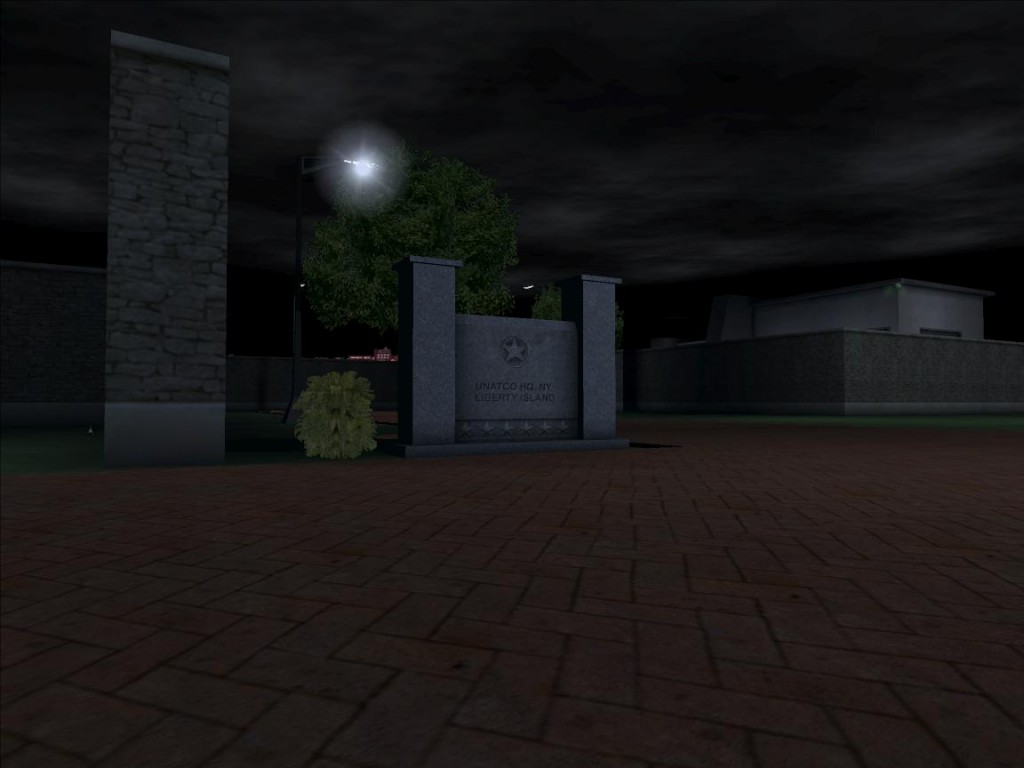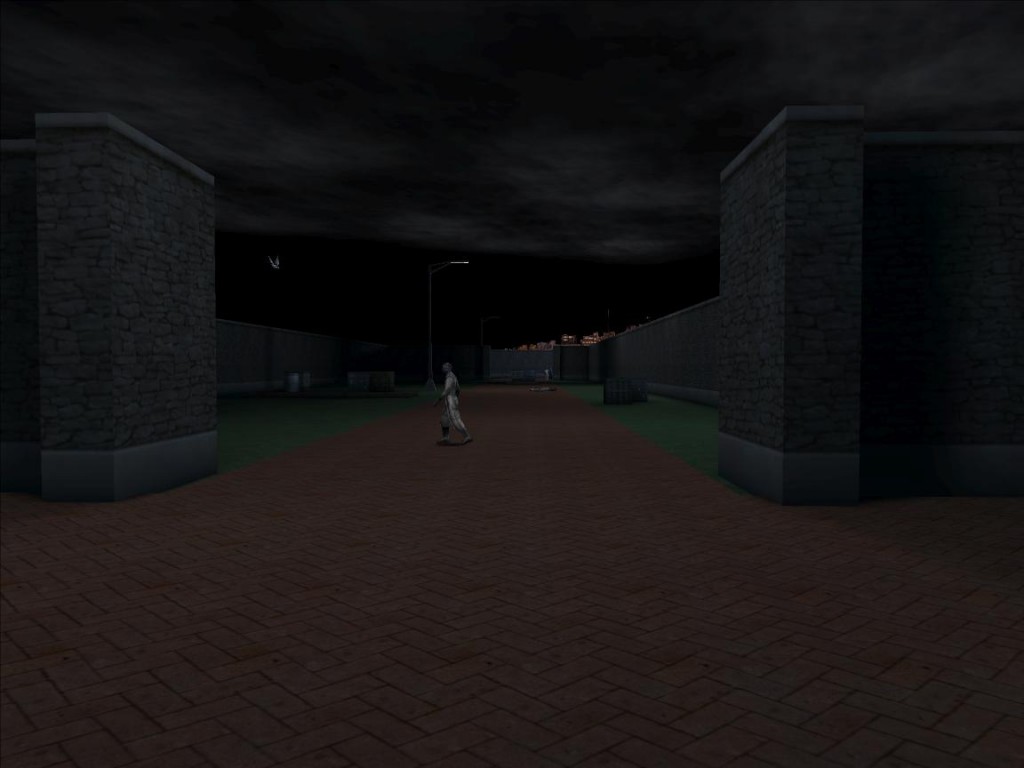“Don’t think you know something about the Lady I don’t. My dad did tours out here.”

Conclusion:
There’s one word whose use is all but unavoidable when discussing Deus Ex: ‘possible’. The path across Liberty Island I have described is only one of many available routes, though all players start and end their paths at the same point the possibilities for what occurs between are legion. Convince Harlen Filben to give you the key to the Statue entrance, or ignore him completely, free Agent Hermann or leave him for the UNATCO Troopers to rescue, arrest NSF Commander Leo Gold or exterminate with extreme prejudice. The choices are yours and by making those choices you are responsible for the consequences.
The themes and mechanics on display in this level are ones that you will become increasingly familiar with as your progress further into the world of Deus Ex. Though some of the later levels present a more limited possibility space the same basic concepts and interactions you first experience here remain consistent. Augmentations and upgraded skills change the range of tools at your disposal yet their interactions with the systemic foundation of Deus Ex rarely change.
Liberty Island is the first level of Deus Ex and compared to similar first levels there are some notable differences. Within moments of arriving you are given the opportunity to use one of the most powerful weapons in the game, the GEP Gun. Even if you are unaware of it’s position in the hierarchy of weaponry in Deus Ex, it is clear that it is an extremely powerful weapon and to be given it this early is a markedly different decision than would be made by the designers of a pure action game. It doesn’t take long to understand the reason why being given access to this incredibly powerful weapon doesn’t totally unbalance the game. Weapons in Deus Ex are merely another form of tool, and though many problems on Liberty Island can be solved through the direct application of violence that is rarely the ‘path of least resistence’ that it would be in a more traditional first person game.
The ‘onion’ like structure of Liberty Island is populated with problem encounters both large and small, this serves to create a possibility space both physical and mechanical that can be freely explored and approached from a variety of directions. With few strict barriers between each problem and no set point of entry you are free to examine each situation from various angles before making any decisions on how to act. This ability to analyse a problem before initiating action promotes intentionality. You are in control and when things don’t work out as planned the reasons are usually easy to understand. It’s possible for elements of one problem to spill over and affect another but this is never truly unpredictable. All elements within the broader problem of Liberty Island itself operate on a consistent set of systemic principles and when unexpected elements do appear their behaviour is predictable. Deus Ex puts you in control, but not always in power.
The flip-side of this freedom to form plans and act on your own schedule is that Liberty Island can suffer from some pacing issues. Some problems will naturally be overcome quicker than others and that is difficult to predict and account for. This can lead to certain routes across the Island feeling more sluggish and drawn out than others depending on your playstyle. An inherent weakness of a game like Deus Ex, when players are the initiators it’s very difficult to manage pacing for dramatic purposes without cutting against that very player intentionality that is a core principle.

As a member of UNATCO, your standing orders with regard to those affiliated with the National Secessionist Forces are “shoot on sight”. They are a ‘terrorist’ organisation who have shown little regard for human life are to be treated as such. This clear cut morality is put to the test very quickly on Liberty Island. The other UNATCO Troopers you meet, such as Tech Sergeant Kaplan and Corporal Collins seem far more ‘gung-ho’ than the NSF whose discussions you overheard. The NSF might not all be named as the UNATCO Troopers are, but they seem far more nuanced in their beliefs than those supposedly upholding the side of ‘law and order’. It’s possible that the reason one group is comprised of named individuals and the other isn’t is simply due to the fact that the player character, JC Denton, is assumed to have already met all the UNATCO Troopers stationed on Liberty Island.
Before you meet him the final ‘boss’, if such a video game centric term is appropriate, is given a name and a face by another unique individual, Harlen Filben. Leo Gold is not some terrorist archetype, he is a person with his own opinions and judgements regarding his actions. Though there is plenty of fodder to be found, especially when the Majestic 12 forces appear during the later stages of the game Deus Ex is possibly the closest we have yet come to surpassing Steve Gaynor’s metric for meaningful violence, and it was released over ten years ago.
Liberty Island is Deus Ex in microcosm, any analysis of the former is inherently also an analysis of the latter. The focus on problems built from systemic elements, the broad possibility space with room for creative solutions, even the problems with pacing, all these issues are as true of Deus Ex as a whole as they are of Liberty Island in isolation. This ability of Liberty Island to be representative of the game that will follow marks it out as a near perfect introductory level.
References:
- Liberty Island is the work of Designer Harvey Smith.
- Deus Ex is the work of Ion Storm Austin (Now closed). It was published by Eidos Interactive, now a subsidiary of Square-Enix.
- A Postmortem of Deus Ex written by Project Director Warren Spector can be found at Gamasutra.
- The entire script of Deus Ex can be found at GameFAQs.
One reply on “Groping The Map: Liberty Island, Part 6.”
Excellent write up, Justin. Really enjoyed it :)